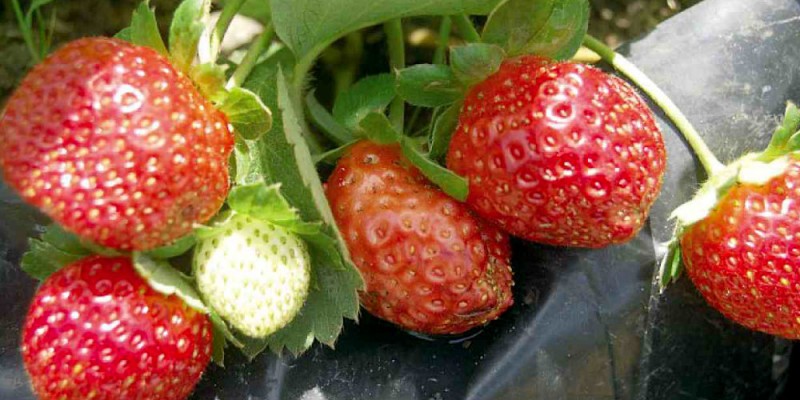Strawberry thrives even in CamSur

LOWLAND STRAWBERRY Strawberry plants are thriving not just in Benguet’s cold climate, but also in a tropical one in Ocampo town in Camarines Sur. An agribusiness graduate has successfully propagated the plants in a lowland farm, including green apples and tangerine, and claims that his fruits are sweeter. JUAN ESCANDOR/INQUIRER SOUTHERN LUZON
OCAMPO, Camarines Sur—He’s a green thumb par excellence in these parts.
Agribusiness graduate Leonardo Libreja successfully propagated strawberry in the lowland of this town, demonstrating that the plant can thrive in a hot climate and bear fruit “sweeter” than those found in the Mountain Province.
It has been a common belief here that plants thriving in cold climate, such as strawberry, apple and tangerine (a citrus fruit similar to the mandarin orange) will barely survive in a tropical climate like in Ocampo town, northeast of Naga City.
Using a marcotted specimen from Hawaii, Libreja, 34, was also able to plant green apple and tangerine, and make them thrive and bear fruit on his farm. He plans to produce commercially the green apple and tangerine.
Marcottage is a method of propagation that induces a shoot or branch to take root while it is still attached to the parent plant.
Article continues after this advertisementUniversity of Hawaii
Article continues after this advertisementUsing a Hawaiian variety of strawberry he brought here after training from 2003 to 2005 at the College of Tropical Agriculture and Human Resources at University of Hawaii Minoa, Libreja took seven years to perfect the “acclimatization” of the variety that he is now starting to mass-produce.
Acclimatization is the process by which a plant is gradually made to adjust with the weather until it becomes used to it.
Libreja said what he did was to expose the strawberry plant to the heat of the sun in varying duration until he was able to create shoots that could withstand the hot climate.
Since the breakthrough, he has been able to produce the kind of strawberry plants that can thrive here and sell these to farms in Camarines Sur and Albay.
Farm boy
Libreja, who grew up on a farm and has loved cultivating crops, said he enjoyed spending long hours in backyard experiments clad in shorts, old shirt and flip-flops.
Farm work eventually became a passion that helped him unlock the secrets of raising strawberry.
After graduating in 2001 from an agribusiness course at Camarines Sur State Agricultural College (now Central Bicol State University of Agriculture), he told his father that he would concentrate on farming.
Two years later, he transformed their farm into an integrated system, complete with aquaculture production and innovative propagation of vegetables on bamboo trays that touch pond water.
He combined these with the planting of ornamental plants to complete the classic “bahay kubo” concept that won him the most outstanding young farmer honors in Bicol in 2003.
Through initiatives of the Department of Agriculture (DA), Libreja was granted an 18-month training in farming in Hawaii where he learned different skills in propagating crops and ornamental plants.
“I learned hydroponics farming, use of drip irrigation and several other techniques in propagating plants scientifically,”he said.
At the end of the 18-month training, Libreja obtained shoots of Hawaiian strawberry and grapes, and marcotted green apple and tangerine that he brought to the Philippines with help from the DA.
Excited to prove he could raise plants that could thrive in a different climate, Libreja planted green apple and tangerine in his farm in Barangay (village) Binit in this town, employing the same process of acclimatization that has helped the plants survive, thrive and bear fruit.
Steady income
But his most important discovery and creation was his success in propagating strawberry through commercial production of fruit-bearing plants, a feat that has been providing him with steady income since December last year.
Libreja sells ready-to-bear-fruit strawberry plants for P300 per plastic bag, an enterprise which he foresees would give him long-term income.
He said he would also branch out to propagating ready-to-bear-fruit grapes in plastic bags and other plants like an herb-like plant called stevia whose leaves are sweeter than sugarcane.
The stevia plant, which Libreja cultivates in his small garden store by the highway, has a distinctive sweet taste when chewed.
He said the garden store where he was cultivating his strawberries would be computerized this year through the installation of an electronic system that would control and monitor the irrigation of his plants.
Garden store
Libreja envisions a garden store where the plants he would sell differ from the other products sold like grafted roses with different colors in each branch or a citrus tree with different branches bearing different fruits.
He said he so mastered grafting such that 98 percent of his creations were surviving and thriving.
Libreja sees himself as becoming the sole distributor of heat-resistant strawberry seedlings with the increasing number of farms adopting his crops for wider commercial use.